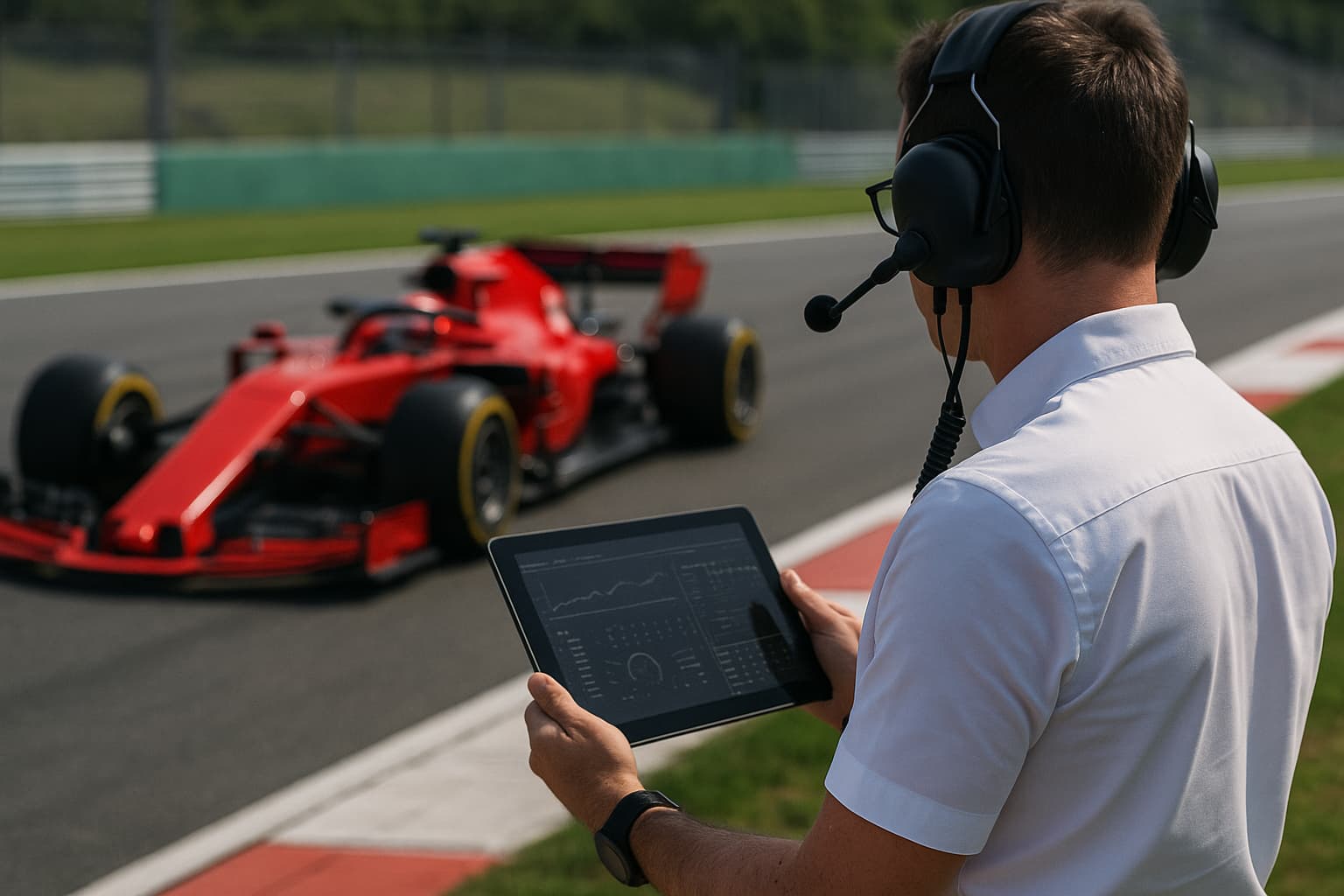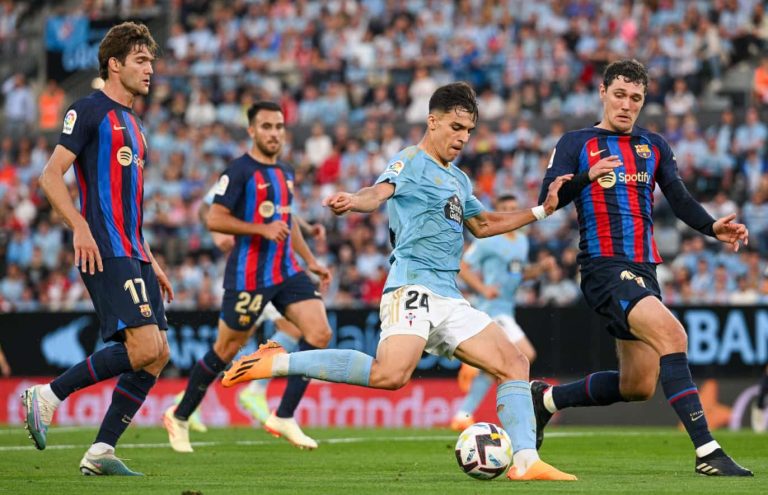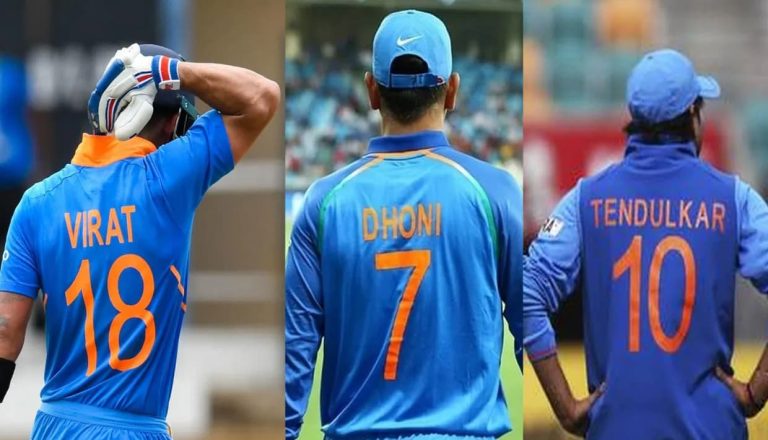How to Become a Formula 1 Race Engineer?
The Formula 1 race engineer represents the ultimate fusion of cutting-edge technology and human expertise in motorsport.
These elite professionals orchestrate the complex symphony of data, strategy, and split-second decision-making that defines modern Grand Prix racing.
Working as a Formula 1 race engineer means joining an exclusive club of fewer than 300 professionals worldwide who shape the outcomes of races watched by over 400 million fans globally.
This coveted position demands exceptional technical brilliance, unwavering composure under pressure, and the ability to translate complex engineering concepts into actionable insights during the most intense moments in motorsport.
The allure of Formula 1 engineering extends beyond prestige.
These roles offer substantial financial rewards, exposure to revolutionary technologies years ahead of mainstream automotive development, and the unique satisfaction of seeing your engineering decisions influence championship battles worth hundreds of millions of dollars.
How to Become a Formula 1 Race Engineer?

However, the path to F1 requires strategic planning, relentless dedication, and a deep understanding of what separates successful candidates from the thousands who aspire to these positions.
🎯 What Does a Formula 1 Race Engineer Do?
The modern F1 race engineer functions as a technical conductor, coordinating multiple complex systems while maintaining seamless communication with drivers traveling at speeds exceeding 300 kilometers per hour.
- Real-Time Performance Optimization During race weekends, race engineers monitor over 300 telemetry parameters streaming from the car at a 100Hz frequency. They analyze suspension loads, aerodynamic efficiency, power unit performance, and tire degradation patterns to make instant setup adjustments. This continuous optimization can mean the difference between pole position and starting mid-grid.
- Strategic Decision Architecture Race engineers collaborate with strategists to develop multi-layered race plans accounting for weather probabilities, Safety Car scenarios, and competitor strategies. They calculate optimal pit window timings, fuel loads, and tire compound selections while maintaining flexibility for real-time strategy pivots based on evolving race conditions.
- Driver-Engineer Partnership The relationship between the race engineer and driver extends far beyond technical communication. Engineers must understand each driver’s unique feedback style, psychological needs, and performance patterns. They provide confidence-building information during qualifying while delivering critical strategic updates during races without overwhelming drivers with unnecessary details.
- Crisis Management and Problem Resolution When technical issues arise, race engineers lead rapid diagnostic processes involving multiple engineering specialists. They coordinate with aerodynamicists, power unit engineers, and data analysts to identify solutions within strict regulatory and time constraints. This requires comprehensive technical knowledge across all vehicle systems.
- Post-Session Analysis and Development Between track sessions, race engineers conduct detailed performance analysis, identifying areas for improvement and coordinating with factory-based engineers to implement solutions. They develop detailed reports for technical directors and contribute to long-term car development strategies.
🎓 Educational Qualifications Required
The academic foundation for F1 race engineering success begins with rigorous technical education combined with specialized motorsport knowledge.
Core Degree Requirements
Successful F1 race engineers typically hold degrees in:
- Mechanical Engineering – Provides fundamental understanding of thermodynamics, materials science, and mechanical systems critical for automotive applications.
- Motorsport Engineering – Specialized programs focusing on racing-specific technologies, vehicle dynamics, and competition engineering principles.
- Aerospace Engineering – Offers advanced aerodynamics knowledge, composite materials expertise, and systems integration skills directly applicable to modern F1 cars.
- Automotive Engineering – Concentrates on vehicle-specific technologies, propulsion systems, and automotive electronics increasingly important in hybrid F1 power units.
Elite Educational Institutions
Leading universities producing F1 engineers include:
- Coventry University (UK) – Prestigious motorsport engineering programs with direct F1 team partnerships
- University of Birmingham (UK) – Strong mechanical engineering foundation with motorsport specialization options
- Politecnico di Milano (Italy) – Renowned for automotive and aerospace engineering excellence
- RWTH Aachen University (Germany) – Leading mechanical engineering programs with Formula Student success
- Imperial College London (UK) – Exceptional mechanical and aeronautical engineering departments
Advanced Qualifications and Specializations
Beyond undergraduate degrees, additional credentials enhance career prospects:
- Master’s in Motorsport Engineering – Demonstrates specialized commitment to racing technology
- Professional Engineering Certifications – Validates technical competency and professional standards
- FIA Technical Courses – Provides understanding of motorsport regulations and safety standards
- Industry-Specific Certifications – Specialized training in areas like composite materials or hybrid systems
🛠️ Technical Skills Needed
Modern F1 race engineers must master sophisticated technical competencies spanning multiple engineering disciplines and advanced computational tools.
Critical Software Mastery
- MATLAB and Simulink – Essential for data analysis, mathematical modeling, and control system development
- Pi Toolbox – Industry-standard F1 telemetry analysis platform for real-time and post-session data processing
- CFD Applications (Star-CCM+, ANSYS) – Computational fluid dynamics for aerodynamic analysis and optimization
- CAD Proficiency (CATIA, NX) – 3D modeling and design verification capabilities
- Programming Languages (Python, C++) – Custom tool development and advanced data analysis automation
Advanced Engineering Competencies: Vehicle Dynamics Mastery
Comprehensive understanding of tire models, suspension kinematics, and handling characteristics under various load conditions.
- Aerodynamic Principles – Deep knowledge of ground effect aerodynamics, vortex dynamics, and aerodynamic balance optimization is critical for modern F1 performance.
- Power Unit Technology – Expertise in hybrid power systems, energy recovery mechanisms, and fuel efficiency optimization strategies.
- Data Science and Analytics – Statistical analysis capabilities, machine learning applications, and predictive modeling for performance optimization.
- Control Systems – Understanding of electronic control units, sensor integration, and real-time system optimization.
- Specialized Technical Knowledge Composite Materials – Familiarity with carbon fiber construction, manufacturing processes, and failure analysis methods.
- Tire Technology – Understanding of tire compounds, thermal behavior, and degradation modeling for strategic planning.
- Regulatory Knowledge – Comprehensive understanding of FIA technical regulations and their impact on design and operational decisions.
🧠 Soft Skills & Mental Agility
Technical excellence alone cannot guarantee F1 race engineer success. The high-stakes environment demands exceptional interpersonal skills and mental resilience.
Advanced Communication Capabilities
Race engineers must excel at multi-level communication simultaneously. During races, they provide clear, concise information to drivers while coordinating with pit wall strategists and maintaining awareness of competitor actions. This requires:
- Clarity Under Pressure – Delivering complex information simply during high-stress situations
- Active Listening – Understanding subtle driver feedback and emotional states
- Cultural Sensitivity – Working effectively in F1’s diverse international environment
- Technical Translation – Converting engineering data into actionable driver guidance
Elite Decision-Making Skills
F1 races demand instant decisions with incomplete information and significant consequences. Successful engineers develop:
- Rapid Analysis – Processing multiple data streams simultaneously while maintaining situational awareness
- Risk-Benefit Assessment – Evaluating potential outcomes of strategic decisions under time pressure
- Intuitive Judgment – Combining analytical thinking with experiential knowledge for optimal decisions
- Confidence – Making decisive calls when consensus isn’t possible
Team Leadership and Collaboration
Modern F1 operations require seamless coordination among hundreds of specialists. Race engineers must:
- Facilitate Communication – Ensuring information flows effectively between departments
- Conflict Resolution – Managing disagreements constructively under pressure
- Mentorship – Developing junior engineers and sharing knowledge effectively
- Cross-Cultural Competency – Working effectively with diverse international teams
🚀 How to Gain Experience
Breaking into Formula 1 requires strategic experience accumulation through multiple pathways, each offering unique advantages for career development.
University-Based Opportunities Formula Student/FSAE Excellence
These competitions provide the closest university-level experience to professional motorsport. Successful teams often receive direct recruitment attention from F1 teams scouting for talent. Key benefits include:
- Hands-on Engineering Experience – Design, build, and test complete racing vehicles
- Team Leadership Opportunities – Develop project management and leadership skills
- Industry Networking – Connect with professionals through sponsorship relationships
- Competition Success – Winning teams receive enhanced recruitment opportunities
Strategic Internship Selection
Target internships with organizations directly connected to F1:
- Mercedes-AMG Petronas – Offers comprehensive graduate development programs
- Red Bull Technology – Provides internships across aerodynamics, simulation, and race engineering
- Ferrari – Historical motorsport excellence with structured training programs
- McLaren Applied Technologies – Broader motorsport applications beyond F1
- Motorsport Suppliers – Companies like Pirelli, Brembo, and Bosch offer F1-adjacent experience
Alternative Racing Series Experience Formula 2 and Formula 3
These feeder series use similar technologies and operational structures to F1, providing direct, relevant experience.
- Endurance Racing – Series like WEC and IMSA offer different but valuable strategic and technical challenges.
- GT Racing – Professional sports car racing provides experience with advanced aerodynamics and data analysis.
- Karting – Grassroots motorsport offers a fundamental understanding of racing dynamics and driver development.
- Entry-Level Pathway Positions Simulation Engineer – Develop virtual testing capabilities and mathematical models supporting race engineering decisions.
- Data Analyst – Specializing in telemetry processing and performance analysis, supporting senior engineers.
- Test Engineer – Conduct development testing and validation work during private testing sessions.
- Trackside Support – Assist senior engineers during race weekends while learning operational procedures.
📈 Career Growth Path
The progression from engineering graduate to F1 race engineer follows established patterns, though individual timelines vary based on performance and opportunities.
Structured Career Development
| Position | Experience Range | Core Responsibilities | Skills Development |
|---|---|---|---|
| Graduate Engineer | 0-1 years | Learning procedures, basic data analysis | Technical foundations, team integration |
| Junior Engineer | 1-3 years | Supporting senior engineers, specialized analysis | Technical depth, problem-solving |
| Performance Engineer | 3-5 years | Car setup, simulation work, performance optimization | Advanced analytics, strategic thinking |
| Race Engineer | 5-8 years | Driver communication, race strategy, and real-time decisions | Leadership, pressure management |
| Senior Race Engineer | 8-12 years | Multiple driver support, mentoring, and strategic input | Advanced leadership, technical expertise |
| Chief Engineer | 12+ years | Department leadership, overall technical strategy | Executive leadership, strategic vision |
Accelerated Development Opportunities
Exceptional performers may advance more rapidly through:
- Outstanding academic performance – First-class honors and advanced degrees
- Competition success – Formula Student victories and technical innovation
- Early leadership demonstration – Project management and team coordination skills
- Technical innovation – Developing new approaches or solving complex problems
- Cultural fit – Demonstrating F1 team values and work ethic
Alternative Career Trajectories Some engineers pursue parallel paths including:
- Aerodynamics Specialization – Focusing on aerodynamic development and wind tunnel testing
- Simulation Engineering – Developing virtual testing capabilities and driver-in-the-loop systems
- Strategy Engineering – Specializing in race strategy and operational research
- Technical Management – Moving into broader technical leadership roles
💰 F1 Race Engineer Salary & Lifestyle
Formula 1 race engineers earn substantial compensation reflecting their specialized skills and the demanding nature of their work environment.
Comprehensive Salary Analysis
United Kingdom (F1 Industry Hub):
- Graduate Engineer: £40,000-£55,000 annually
- Junior Engineer: £55,000-£75,000 annually
- Performance Engineer: £75,000-£100,000 annually
- Race Engineer: £100,000-£180,000 annually
- Senior Race Engineer: £180,000-£300,000 annually
- Chief Engineer: £300,000-£500,000+ annually
International Salary Comparisons:
- Switzerland: 15-25% premium due to cost of living
- Italy: Similar to the UK, with team-specific variations
- Germany: Competitive salaries with strong benefits packages
- United States: A Growing market with 20-30% salary premiums
Comprehensive Benefits Packages
Beyond base salaries, F1 engineers receive:
- Performance Bonuses – Substantial payments for championship success
- Travel Allowances – Covering extensive race calendar travel
- Professional Development – Funding for continued education and training
- Health Benefits – Comprehensive medical and wellness programs
- Retirement Planning – Generous pension contributions and investment options
Lifestyle Reality Assessment
The F1 lifestyle demands significant personal sacrifices:
- Extensive Travel Commitments – Engineers typically travel 200+ days annually, visiting race locations worldwide with limited time for personal activities.
- Intense Work Periods – Race weekends involve 16-hour days with minimal breaks, requiring exceptional physical and mental stamina.
- Limited Personal Time – The race calendar leaves little time for family commitments, hobbies, or personal development outside work.
- High-Pressure Environment – Constant performance pressure with public scrutiny and significant financial implications for decisions.
- Career Longevity Considerations – Many engineers transition to less demanding roles after 10-15 years due to lifestyle pressures and family priorities.
🔗 Real-Life Success Stories
Learning from accomplished F1 race engineers provides valuable insights into successful career development strategies.
Success Story 1: Peter Bonnington (Mercedes-AMG Petronas)
Peter “Bono” Bonnington serves as Lewis Hamilton’s race engineer, contributing to multiple championship victories through an exceptional driver-engineer partnership.
Career Foundation: Bonnington studied mechanical engineering before joining McLaren in 2000. He progressed through various engineering roles, developing expertise in data analysis and race strategy.
Key Success Elements:
- Technical Versatility – Demonstrated competency across multiple engineering disciplines
- Driver Relationship Excellence – Developed exceptional communication skills with high-profile drivers
- Pressure Performance – Consistently delivered optimal performance during championship-deciding moments
- Continuous Innovation – Adapted to changing regulations and technological developments
Success Story 2: Guillaume Rocquelin (Red Bull Racing)
Known as “Rocky,” Rocquelin has worked with multiple F1 drivers and contributed to championship-winning campaigns through strategic excellence.
Career Development: Rocquelin began his F1 career with McLaren before moving to Red Bull Racing, where he developed into one of F1’s most respected race engineers.
Key Success Factors:
- Strategic Thinking – Exceptional ability to develop and execute complex race strategies
- Technical Leadership – Mentoring junior engineers and contributing to team technical development
- Adaptability – Successfully working with different drivers and adapting to their unique needs
- Long-term Perspective – Building sustainable competitive advantages through systematic improvement
❓ Frequently Asked Questions
Do I need a postgraduate degree to become an F1 race engineer?
While not mandatory, a master’s degree in motorsport engineering or related fields significantly enhances career prospects. Many successful F1 engineers hold advanced degrees, and the specialized knowledge demonstrates a commitment to the field. However, exceptional candidates with bachelor’s degrees and relevant experience can succeed through outstanding performance and strategic career development.
- Can engineers from other industries transition to F1?
- Yes, engineers from aerospace, automotive, and other high-tech industries can successfully transition to F1. The key is demonstrating transferable skills such as data analysis, system optimization, and working under pressure. Many F1 engineers have backgrounds in aerospace, defense, or automotive industries. The transition requires understanding motorsport-specific applications and developing relevant experience through internships or junior racing series.
- Which F1 teams offer the best career development opportunities?
All current F1 teams offer excellent career development, but some are particularly known for engineer development: Mercedes-AMG Petronas has comprehensive graduate programs, Red Bull Racing offers innovative technical challenges, McLaren provides diverse engineering opportunities, and Ferrari offers historical motorsport prestige. The best choice depends on individual career goals, technical interests, and cultural fit.
- What’s the realistic timeline from graduation to race engineer?
The typical progression from graduation to a race engineer role requires 5-8 years, depending on individual performance, opportunities, and career path. Exceptional candidates may advance faster through outstanding performance, while others may take longer to develop necessary skills. The key is consistent progression through intermediate roles while building technical expertise and soft skills.
- How do race engineers differ from other F1 engineering roles?
Race engineers focus on real-time race weekend operations, driver communication, and strategic decision-making. Performance engineers concentrate on car setup and simulation work. Aerodynamicists specialize in aerodynamic development. Design engineers focus on component development. Each role requires different skill sets, with race engineers needing exceptional communication skills and pressure management capabilities alongside technical expertise.
📚 Essential Resources and Final Guidance
Critical Professional Development Resources
Educational Platforms:
- FIA Institute Professional Development – Specialized motorsport education and certification programs
- Formula Student Global – University competition networks and alumni connections
- SAE International – Technical papers, conferences, and professional development opportunities
- Motorsport Industry Association – Industry insights and networking opportunities
Technical Learning Resources:
- MATLAB Academy – Advanced data analysis and modeling skills
- CFD Online – Computational fluid dynamics knowledge and community
- Pi Research – Specialized motorsport data analysis training
- Bosch Motorsport – Technical seminars and product training
Networking and Career Opportunities:
- LinkedIn F1 Engineering Groups – Professional networking and job opportunities
- Autosport Engineering Forum – Technical discussions and industry insights
- Formula 1 Official Team Websites – Direct access to career opportunities and team information
- Motorsport Trade Publications – Industry news, technical developments, and career insights
Strategic Career Development Advice
- Build Technical Excellence: Focus on developing strong analytical skills, software proficiency, and understanding of fundamental engineering principles. Technical competency forms the foundation for all other skills.
- Develop Communication Skills: Practice explaining complex technical concepts clearly and concisely. Strong communication skills differentiate successful race engineers from purely technical specialists.
- Gain Practical Experience: Seek hands-on motorsport experience through any available opportunities. Even grassroots racing provides valuable insights into competition dynamics and pressure management.
- Network Strategically: Build relationships with motorsport professionals through competitions, conferences, and professional organizations. Many opportunities arise through personal connections.
- Stay Current: F1 technology evolves rapidly. Maintain awareness of technical developments, regulatory changes, and industry trends through continuous learning.
- Consider Alternative Paths: While F1 is the ultimate goal, other motorsport series offer valuable experience and may provide better work-life balance. Consider Formula E, IndyCar, or endurance racing as alternative career paths.
- Prepare for Sacrifices: F1 careers demand significant personal sacrifices, including extensive travel, long hours, and high-pressure situations. Ensure you understand and accept these requirements before committing to this career path.
The journey to becoming a Formula 1 race engineer represents one of motorsport’s most challenging and rewarding career paths.
Success requires exceptional technical skills, mental resilience, and strategic career planning.
While the path is demanding, those who achieve this goal join an elite group of professionals working at the pinnacle of automotive technology and competitive motorsport.
Remember that F1 careers are built through consistent excellence over many years.
Focus on developing strong technical foundations, building relevant experience, and demonstrating the personal qualities that enable success under extreme pressure.
The motorsport industry rewards dedication, technical innovation, and the ability to perform when stakes are highest – qualities that define successful Formula 1 race engineers throughout their careers.






